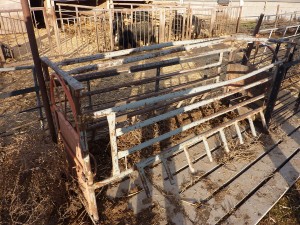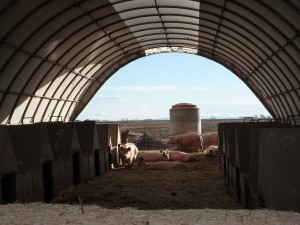Pure Country Pork: Farm to Fork Partner and Role Model for the Industry
In the middle of December, during one of the coldest weeks of the year, I found myself driving out of the Portland cityscape to the beautiful Washington countryside near Ephrata to meet some pigs.
Yes you read that correctly…pigs. I knew I had to visit Pure Country Pork after learning it was the first sustainable hog operation in the United States to be certified by Food Alliance (which evaluates how a farm treats its animals as well as its workers and the environment), under its stricter guidelines of no farrowing crates or gestation stalls. Plus, since Bon Appétit committed last year to phasing out all pork raised using gestation crates by 2015, I knew I needed to talk to some experts to better understand the significance of this commitment.
Who better than Paul, Karrie, and Paul Klingeman Jr., Pure Country’s owners and managers?
As I approached the farm, I could see half-dome-shaped structures speckled across the frosty landscape. These “hoop houses,” with their deep straw bedding, each provide shelter for about 160 hogs during the cold of winter and the heat of summer, while still allowing access to the outdoors. This is a stark contrast from the indoor, cement-floored warehouses that traditionally hold thousands of pigs that never see the light of day and can hardly move they are packed so tightly together. (Pure Country never supports more than about 500 sows plus their offspring.) My admiration for this system grew upon learning that the Klingemans don’t need to use electricity to keep the pigs warm or cold: they rely on the compost at their feet to generate heat in the winter, while in the summer, to cool the pigs, they capitalize on wind flow to circulate cool air through the structures that shade the pigs from the hot sun.
As Paul, Karrie, and their son Paul Jr. took me around their 40 acre sustainable hog operation, they talked about the differences between their practices and those of conventional farmers. They showed me the remnants of an old farrowing crate, which is a cage used in conventional operations to confine sows (mother pigs) during the time their piglets are weaned from nursing. (Gestation crates, meanwhile, are used to confine sows while pregnant.)

An old farrowing crate used in conventional pig production to confine sows during the time they are nursing their piglets.
I had read about these crates but had never seen one in person and as much as I knew they were bad, the true horror of this practice came to light after seeing the sows (which are hefty animals) standing in the distance behind this small, jail-like box. The sows are so physically constrained in both types of crates that their use has been compared by an animal welfare expert, Temple Grandin, to a human spending years of their life in an airplane seat (though I would take it a step further and say it is like being in a straight jacket, because the sows can hardly move their limbs or turn their heads).
Thankfully at Pure Country Pork, all the pigs are free to roam and the sows actually birth and raise their piglets in little huts that look like A-frame mini-cottages within the hoop houses. These huts give the sows and piglets additional shelter and privacy, while also allowing them to roam and move outdoors. Not to mention their pigs are never administered antibiotics!
When I asked Paul how he got into farming pigs sustainably, he joked that it was 4-H project that got out of hand! He said that they hadn’t always raised their pigs this way, but in the late ‘90s, he was fed up with the conventional system, wanted to get outdoors, and had a customer base that was asking for more humanely raised pork. They made the switch in the year 2000 and have never looked back!
The Klingemans care deeply about their pigs, even speaking fondly about some of the memorable ones like the “bowling pig,” who’d mastered the art of rolling a bowling ball. At Bon Appétit, we’re proud to serve Pure Country Pork in many of our Northwest cafés, including University of Portland, Lewis & Clark College, and Reed College. The Klingemans are terrific role models for the kind of hog farming that we’d love to see the industry move toward. Phasing out gestation crates is just the first step.
